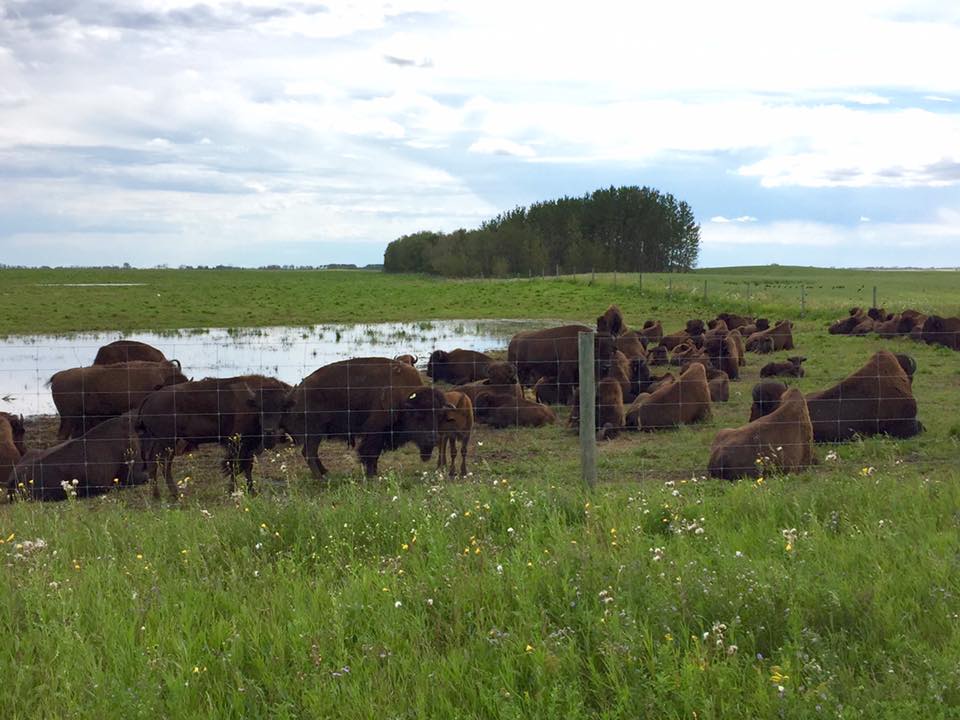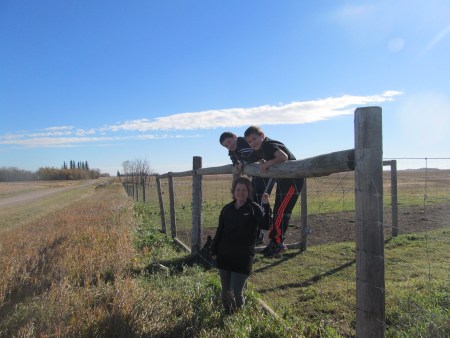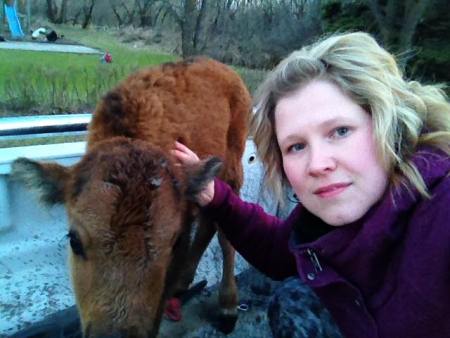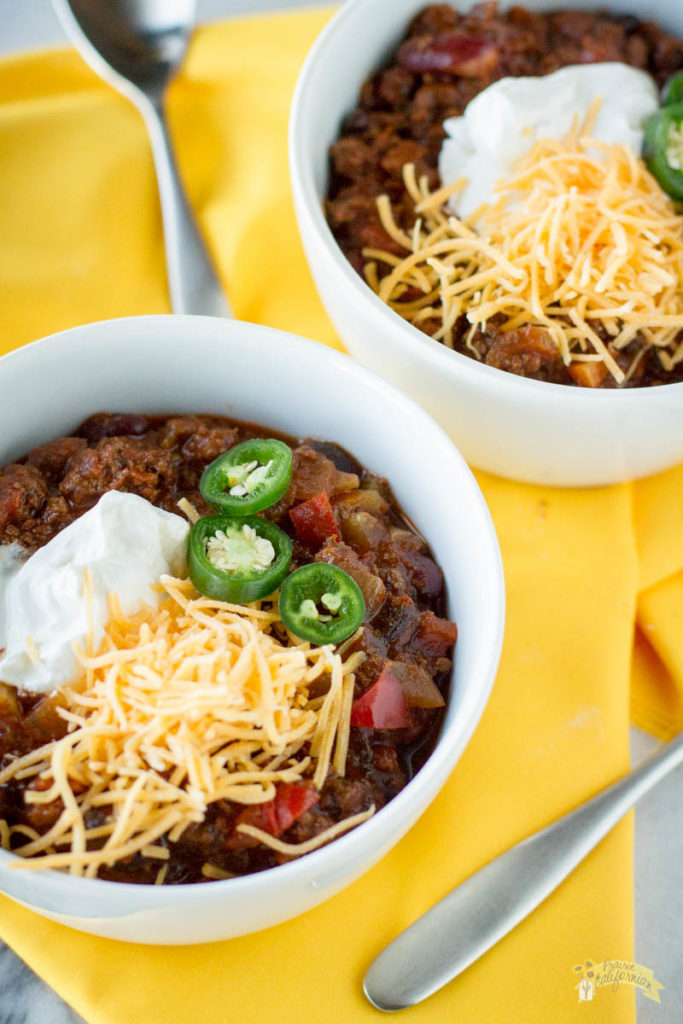
Bison is a great lower fat red meat alternative that is rich in flavor and can be utilized in any most any recipe that calls for beef! I was so excited to include bison in Thirty Days of Food so huge thank you to Angela for reaching out to me. This Bison Chili includes one of my favorite things ever, chipotle chiles in adobo sauce. They are a must have in my pantry and the best part is that if you don’t use the whole container, they store well in the fridge for weeks. Today Angela joins us to talk farming and raising bison in North East Saskatchewan!
ANGELA JONES OF AGRICULTURE TODAY
North East Saskatchewan, Canada
When did you start farming? What brought you into farming?
I was raised on a family farm but growing up I was always told to ‘get off the farm and get a good job’. The 80’s were a tough economic time for agriculture and the future didn’t look very bright. I moved away to go to school but once I started dating my husband the lure of country life got the best of me. Even though farming has been in my family for generations, I still find myself learning new things every day.
Are there any differences between your farm now and when you were a kid?
Agriculture has changed monumentally since I was a kid. I have fond memories of the hard work that was involved in harvesting a crop alongside my family years ago but I also have many painful memories of the tough years that came with yield loss due to disease, pests, drought, early winter and equipment breakdowns (In our area of the world we have a very short window to grow and get the crops harvested before it snows so equipment performance is very important to avoid leaving crop out over winter). Every day I am thankful for the current technology in equipment and crop varieties that help us to navigate these risks better than we did when I was growing up. GE varieties of canola have been a big advantage to our area of the world, helping us improve our yields and manage pests while using safer crop protection products and more environmentally friendly farming practices such as no till. Because of the new varieties of canola developed over the last 20 years it has become one of Saskatchewan’s highest valued Agri-Food exports.

Who farms with you and what are their roles?
Although I have been accused of owning a ‘factory farm’ in the past, in reality our farm is ran by my husband, his cousin (who works with us full time), and myself with the occasional help from our 2 boys who are 14 and 10. My husband oversees all aspects of the operation and markets the grain, his cousin takes care of many of the day to day operations such as moving grain and caring for the animals, I handle the finances, and when we are in planting and harvest season it is all hands on deck. No one is to good for any job and we all pitch in and do everything. We sometimes have seasonal help during the busy times and have been blessed with good people over the last couple years but the majority of operations are handled by our family.
What has been the hardest part of farming for you?
Every aspect of farming is hard. I think I have struggled the most with the uncertainty that comes with this lifestyle. Having a financial background I have always been a ‘planner’ wanting to set out goals and milestones for the future. It has been an adjustment to make peace with the fact that in agriculture, you can work as hard as possible and still come out behind because there are no guarantees and Mother Nature decides our paychecks.
What has been the most satisfying part of farming for you?
There is a special sense of pride that comes from growing safe healthy food to feed a nation that almost can’t be explained. I am proud of the lessons my children are learning about good environmental stewardship and hard work, and I love the family life that the farm allows us to live.

What crops (or animals) do you grow and why?
We grow wheat, barley, oats, lentils, canola and raise bison. We grow these crops because they are best suited to our climate and short growing season. Canola tends to bring in one of the highest returns and often other cereals and pulse crops are grown to maintain a healthy rotation to best care for our soil. Our farm works with an agronomist to test the soil to see what it is lacking or has to much of and he helps us form a cropping plan. The bison have only been part of our operation for a few years but we find that they are a good fit because any grains that are unfit for human consumption or to sell, we can feed to the animals (often these crops would otherwise have no market and would be wasted). Land that can not be used to grow crops can be baled or grazed by the animals. We are always working to improve the sustainability of our operation.
What do you think was the most useful advance in farming such as machinery, genetics, chemicals, etc.?
The most useful advance in farming in my area, hands down, is the tractor or combine cab. There are times we are harvesting crops in below freezing temperatures and I like to be warm. In all seriousness, I continue to be thankful every day for the new seed varieties that farmers can choose from. Crops like genetically engineered canola have been widely adopted in our area because they offer many advantages to producers. New varieties of wheat and oats that are resistant to pests (such as midge or rust) have helped farmers provide a better quality food product and reduce the use of pesticides. All in all, biotechnology has provided farmers with immense advantages thus far, and offers many possibilities for the future. Living in an area that has a growing season of only around 100 days I am hopeful that in the future GE or hybrid varieties of crops will be developed with a ‘reduced amount of days until maturity’ trait. This will give producers in this area more choices for our crop rotations.

What is one thing you’d like to get across to the general public about what you do?
I enjoy connecting with consumers and telling the story of our farm life. The one very important thing that I really want consumers and producers alike to understand is that ‘one size does not fit all’ when it comes to agriculture. Sometimes people make the mistake of thinking that because a certain farming practice works in one area, that it will work in another. I have fallen in this trap myself quite honestly, but after traveling to other parts of the world and connecting with producers from many different countries, I now understand that the methods farmers use are dependent on so many factors such as soil type, area climate and precipitation, crop rotation history, heat units, wind, the list goes on and on. No one is as good of a judge of the practices used on an operation as the farmer who has worked on the land for years, even decades. Taking the best possible care of our land and the environment is very important to us because it is our future and the future for our children.
What advice would you give to anyone interested into getting into your field?
Go for it! If you are looking for a job to be passionate about, agriculture should be your field of choice. It really grows on you. (Puns intended). If you can take the bad with the good, it really is a wonderful and fulfilling lifestyle.
What is your favorite thing to do with the food crop you grow?
Our family fully enjoys bison cooked a number of ways. Comparisons to other meat sources have shown that bison has a greater concentration of iron and some of the essential fatty acids. It is a flavorful and lower fat red meat alternative that is similar to beef but has been described as having a rich flavor that satisfies you more while eating less. I use bison meat as a replacement in any recipe containing beef with our family favorites including ground bison tacos and sweet and sour bison meatballs.
Any memories you want to share about this feature ingredient?
When I was growing up my aunt and uncle; Jack and Marie Evans of Clair Side Bison were one of very few bison producers in Canada. They always made sure we had a steady supply of this heart healthy protein in our diet and now I am doing the same for my family.
You can find more from Angela by visiting her blog Agriculture Today, by giving her Facebook page a LIKE, tweeting with her on Twitter, or following her on Instagram!

If you like your chili a little more soup-like, feel free to add a bit more liquid than the recipe calls for. I like my chili to be thick. This chili is the perfect amount of spice and heat, it will be your new favorite!
PrintChipotle Bison Chili
bison chili with chipotle peppers in adobo sauce
- Prep Time: 10
- Cook Time: 45
- Total Time: 55 minutes
Ingredients
- 1 1/2 pounds ground bison
- 2 tablespoons olive oil
- 1 large onion, diced
- 2 stalks celery, diced
- 1 medium jalapeno, seeded and diced
- 1 large bell pepper, diced
- 1 tablespoon garlic, minced
- 1/4 cup chile powder
- 1 tablespoon oregano
- 1 tablespoon cumin
- salt and pepper to taste
- 1 (28 ounce) can diced tomatoes
- 1 (7 ounce) can tomato sauce
- 1 teaspoon beef bouillon
- 2 tablespoons chipotles in adobo sauce, chopped
- 1 tablespoon cocoa powder
Instructions
- In a large heavy bottom pot over medium high heat, brown the bison. Once browned, remove from pot and set aside.
- Add the olive oil. Once hot, add the onion, celery, jalapeno, bell pepper, and garlic. Saute 4-5 minutes or until softened. Add the chile powder, oregano, and cumin. Add the diced tomatoes and their juices, tomato sauce, and beef bouillon. Add water or beer if desired. Add the chipotle peppers and cocoa powder, stir well to combine.
- Adjust seasonings as needed. Reduce heat and let cook 20-30 minutes over medium low heat.
- Remove from heat and top with your favorite chili toppings, enjoy!
Nutrition
- Serving Size: 6
This post is part of my Thirty Days of Food series where I am writing about food and farming for the entire month of November, to find out more about it all or how to follow along, visit my Thirty Days of Food page to find more great recipes with farmer features!


